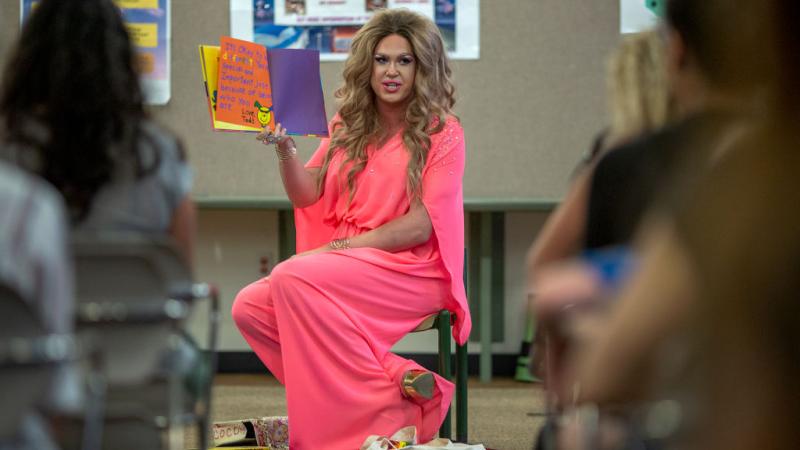Harrowing details emerge in trial of ISIS fighter accused in deaths of several Americans
West continues to struggle with prosecution of foreign terrorists as El Shafee Elsheikh, most high-profile ISIS member to stand trial in U.S., faces former hostages, victims' families.
Now in its second week, the trial of a self-confessed ISIS terrorist in Alexandria, Va., has revealed harrowing details about the terrorist group's brutal schemes to kidnap, torture, and kill foreign nationals, including American journalists and aid workers.
El Shafee Elsheikh, a British man born in Sudan, is the most high-profile ISIS fighter to stand trial in the United States. He's accused of being part of the notoriously cruel group of ISIS jihadists known as the "Beatles," a nickname used by their captives because of their British accents.
Federal prosecutors accuse Elsheikh, 33, of assisting in the kidnapping, torture, and murder of four Americans — journalists James Foley and Steven Sotloff, and aid workers Kayla Mueller and Peter Kassig — as well as several Britons and captives from other countries between 2012 and 2015.
Elsheikh faces life in prison if convicted on the eight charges he faces. He and fellow "Jihadi Beatle" Alexanda Kotey were captured by U.S.-backed Kurdish forces in 2018 as they attempted to flee to Turkey with ISIS territorial control in Iraq and Syria collapsing.
In October 2020, both men were brought to Virginia to face trial following negotiations between the U.S. and U.K., which delayed the transfer until U.S. authorities agreed not to pursue the death penalty. Kotey pleaded guilty in Alexandria last year.
Elsheikh had originally traveled from England, where he was raised, to Syria in 2012, according to court documents. He first joined al Qaeda before signing up with ISIS. As a member of ISIS, prosecutors say, Elsheikh helped take hostages in order to demand the release of ISIS terrorists in prison or to collect ransom.
Some hostages were released. Others were killed, sometimes beheaded, on camera, and the footage was then disseminated online as jihadist propaganda.
Foley, Sotloff, and Kassig were decapitated by ISIS fighters. Mueller was forced to marry the late ISIS leader Abu Bakr al Baghdadi, who repeatedly raped her until she was murdered at the age of 26.
On Tuesday, Mueller's mother Marsha testified that she and her husband tried several times to save their daughter, describing dozens of email exchanges with ISIS, which demanded the release of convicted terrorist Aafia Siddiqi or five million euros in exchange for her release.
In 2015, ABC News found the FBI and then-President Barack Obama's White House prevented the Muellers and other families from paying ISIS's ransom demands.
"Kayla is not your enemy," Marsha Mueller said in a video message to ISIS that was played at the trial. "I ask from her mother's heart that you show your mercy and release our daughter."
ISIS captured Kayla in August 2013, when she was accompanying her boyfriend, a Syrian national, on a trip to a hospital where he was contracted to repair a satellite dish. Some 18 months later, the terrorist group emailed Carl and Marsha Mueller photos of their daughter's dead body.
After the jury was dismissed for lunch on Tuesday, a friend of Kayla's shouted at Elsheikh that he was going to hell as he was being escorted out of the room.
Foley's mother Diane also testified this week, recalling her reaction after learning her son was beheaded.
"Incredible shock, I didn't believe it — I didn't want to believe it," she recounted. "I was hoping it was just some cruel joke."
Foley was kidnapped in Syria in 2012 and killed on video by Mohammed Emwazi, the ISIS Beatle better known as "Jihadi John," who was later killed in a drone strike in 2015.
"I really feel and have such empathy for these families," said Debra Burlingame, an activist and former lawyer whose brother was the pilot of American Airlines Flight 77, the plane that was hijacked and crashed into the Pentagon on 9/11. "These trials are important and educational if they're covered and don't get sidetracked by politics. These trials in civilians courts often become politicized, with everyone having some cause they want to further via these defendants," whom she described as "war criminals."
Beyond aggrieved family members, former hostages also spoke before the jury, revealing new and grisly details about the sadistic brutality of ISIS.
Spanish journalist Marc Marginedas, for example, testified that he and others were beaten severely.
They "really understood how to inflict pain," he said.
Others recounted instances of waterboarding, humiliation, and forcing hostages to brutally fight each other for the terrorists' entertainment.
"They played lots of games with us," testified Italian aid worker Federico Motka. "They gave us dog names and told us that if they called us day or night we had to respond."
Motka added the captives were emaciated and would be beaten if they disobeyed.
Elsheikh's lawyer, Edward MacMahon, admitted his client was an ISIS fighter but denied he was a member of the Beatles.
Elsheikh was "a simple ISIS fighter," MacMahon said in his opening statement. "Mr. Elsheikh was not a member of the 'Beatles' and not involved in the kidnapping, torture, and deaths of any of these individuals."
Prosecutors countered that Elsheikh was a senior ISIS leader, not a typical foot soldier, who especially enjoyed brutally mistreating his captives.
"If a hostage looked at any of the three men, they would be beaten," said prosecutor John Gibbs, referring to the Beatles. "In fact, they did not have to do anything to be beaten."
Beyond the grisly details, the location of the trial has been a point of contention — specifically the way in which foreign terrorists are prosecuted now and moving forward.
Indeed, some experts argue Islamist terrorists waging war against the U.S. shouldn't stand trial in civilian American courts where regular criminals are tried
"It is obvious that committing brutal murder and torture on behalf of an organization which established itself over large swathes of territory, as El Shafee Elsheikh is accused of doing, is in some ways qualitatively different than everyday criminal violence," said Kyle Shideler, director and senior analyst for homeland security and counterterrorism at the Center for Security Policy. "Trying such acts in an ordinary criminal court is a tremendous challenge to our criminal justice system, which is ill-equipped to deal with such realities."
Burlingame similarly argued the U.S. is giving due process rights to terrorists in civilian courts for "what we would call war crimes, not normal felonies."
"Their only connection to the U.S., the place of their trial, is it's the birthplace of some of their victims who they tortured and murdered," she said. "We're not talking about U.S. citizens or U.S. residents."
The higher standard of proof in federal courts makes it tougher for prosecutors to convict suspected terrorists. In 2010, for example, Ahmed Khalfan Ghailani was acquitted of all but one of the 285 charges of murder and conspiracy against him for the 1998 U.S. Embassy bombings in Kenya and Tanzania that killed 224 people, including several Americans.
"Warfighters can't exactly stop to collect evidence, establish a chain of custody — things that U.S. courts require — which makes prosecution harder," said Burlingame. "These are war zones, not crime scenes."
Others countered that such trials in federal courts are effective and adhere to U.S. values.
"We're a nation of laws," David Viola, a professor at the John Jay College of Criminal Justice's Center on Terrorism, told the Guardian. "Our power and our legitimacy can never solely be derived from our military might. We have to hold the likes of Elsheikh accountable ... in front of a judge and jury. This is the kind of proof we need for the world, and for ourselves, that laws can have a more profound and lasting impact, and importantly, bring closure to the families of the men and women who died."
Shideler noted that 21 years after 9/11, cases such as that of Khalid Sheikh Mohammad, who orchestrated the attacks, have still not had a resolution in civilian court. The U.S. government's attempts to try detainees by military commissions at the Guantanamo Bay military prison "have devolved into an utter clown show," he added.
"Preventing terrorists from making a mockery of American justice is why military commissions were envisioned in the first place," he said. "There is no prospect for an improved and effective military commission system. The hostility of the Biden administration to Guantanamo Bay's use as a detention facility (as with the Obama administration before it) ensures that it will never be allowed to serve as an effective venue for holding and judging terrorists like Elsheikh."
Shideler said the West continues to struggle with the challenge of how to deal with foreign fighters captured on battlefields abroad, noting this problem will only grow in the future. And even if a terrorist is convicted, he argued, the jihadist threat posed by that individual doesn't end there.
"In this particular case, the details of Elsheikh's alleged reign of terror more than justifies a life without parole sentence," he said. "If convicted, however, what steps will be taken to ensure that Elsheikh does not begin a new life of prison 'dawah' radicalizing and recruiting fellow prisoners? Western nations continue to struggle with the impact that convicted terrorists have in leading cells of prison radicals, some of whom will eventually reemerge from jail and are likely to reoffend."














